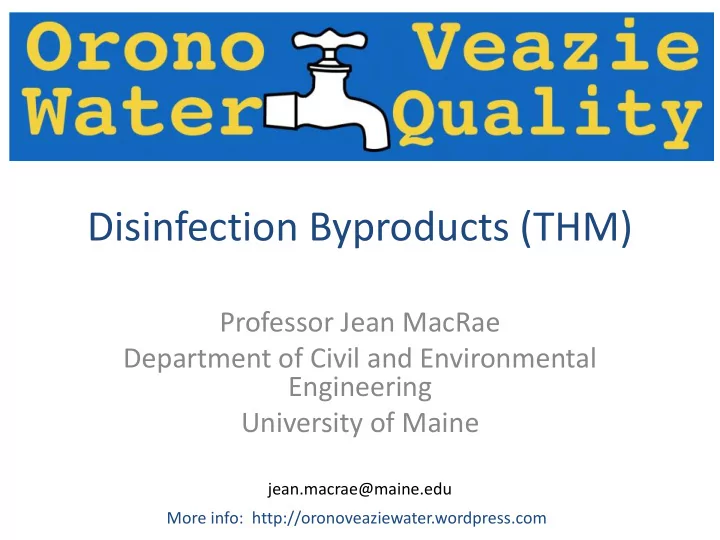

Disinfection Byproducts (THM) Professor Jean MacRae Department of Civil and Environmental Engineering University of Maine jean.macrae@maine.edu More info: http://oronoveaziewater.wordpress.com
TTHM = total trihalomethanes • Cancer* – Bladder, colon, rectal, liver • Liver and CNS effects** • Reproductive effects*** – Miscarriage, premature chloroform birth, low birth weight *for chloroform 70-yr exposure to 6 ppb chloroform in drinking water increases fatal cancer risk by 1/1,000,000 ** High level exposures – humans *** High level exposures – animal studies
TTHM in our water over time • Out of compliance from fall 2011 to mid- 2013 • Lower values recently • Average 69 ppb • 27% higher than MCL
HAA = haloacetic acid • Uptake is by ingestion – Not skin or inhalation • Health Effects – Eye and skin irritation – Possible human carcinogen – Nerve, liver, immune damage – Reproductive effects Dichloroacetic acid • RfD = 0.004 mg/kg-d • MCL = 60 ppb (yearly average) – Testing since 2/2014, one value above MCL
THM and HAA formation Cl 2 OM Important Factors: OM concentration Cl 2 concentration Time Temperature THM + HAA
Where our water comes from
Why Chlorinate?
Does it have to be chlorine? • Ozone • Ultraviolet light • Chloramine – N product toxicity, higher dose • Chlorine dioxide – Chlorite and chlorate health effects, cost
Regulatory TTHM levels EPA limits Air • Maximum contaminant Level (MCL) in drinking water – 80 µg/L – OV water did not meet requirement for 1.5 years • Reference Exposure Level for inhalation = 300 µg/m 3 • Reference Dose (RfD) – 0.01 mg/kg-day http://www.epa.gov/ttn/atw/hlthef/chlorofo.html
Estimate of Dose* Time averaged air Average OVWD Typical daily concentration based on concentration volume air Typical daily assumptions and using 2005-2014 breathed/day water data from a study on consumption THM exposure + 15 𝑛 3 𝐸𝑝𝑡𝑓 = 1.1 𝑀 𝑒 ∗ 0.07 𝑛 𝑒 ∗ 0.007 𝑛 = 0.19 𝑛 𝑒 𝑛 3 𝑀 0.19 𝑛 𝑛 𝑒 𝐸𝑏𝑗𝑚𝑧 𝐸𝑝𝑡𝑓 = 80 𝑙 = 0.0023 𝑙 − 𝑒 About 1/4 of RfD Typical body 𝑛 weight 𝑆𝑔𝐸 = 0.01 𝑙 − 𝑒 *Estimate doesn’t include uptake through the skin or from swimming or other sources
Estimate of Toddler Dose Time averaged air Average OVWD Typical daily concentration based on concentration volume air Typical daily assumptions and using 2005-2014 breathed/day water data from a study on consumption THM exposure + 5 𝑛 3 𝐸𝑝𝑡𝑓 = 0.4 𝑀 𝑒 ∗ 0.07 𝑛 𝑒 ∗ 0.007 𝑛 = 0.06 𝑛 𝑒 𝑛 3 𝑀 0.06 𝑛 𝑛 𝑒 𝐸𝑏𝑗𝑚𝑧 𝐸𝑝𝑡𝑓 = 11.4 𝑙 = 0.0057 𝑙 − 𝑒 57% of RfD Typical body 𝑛 weight 𝑆𝑔𝐸 = 0.01 𝑙 − 𝑒
Reducing your exposure • Take shorter showers • Lower hot water heater temperature • Ventilate when you use hot water: – Bathroom fan – Above-stove fan (if it vents outside) – Open kitchen window • Drink bottled water • Kitchen faucet filter • Whole house filter – NSF, UL, ANSI certified for VOC removal
OVWD Treatment System Add chlorine to Add chlorine for regenerate the secondary disinfection greensand filter media (safety in distribution) Fluoride Add permanganate and coagulant to help remove metals and OM Adjust pH Storage Greensand Plus filters for Fe, Mn, OM removal Pump source water Storage and distribution
What OVWD has done so far 1. Stopped using well 4 – mostly use wells 1 and 3 5 – Lower OM and TTHMFP 3 2. Pipe flushing 4 – Lower time for reaction 3. Reduced dose of chlorine before the filters – Lower THM formation rate 4. Optimized coagulant dose 2 1 – Improve OM removal (and metals) 5. Change water loading rate on filters
More Ways to Prevent and Remove THMs • New source with low OM • Change oxidant and method for filter regeneration • Change disinfectant – ClO 2 , chloramine • Aerate and vent storage tanks • Add OM or THM removal step – Activated carbon – Coagulation/flocculation – Filtration
Action • OVWD meetings: Tuesday October 14, 7 pm Orono council chamber – Advocate better communication – Strategic/long range plan to improve water quality – “same old” faces – PJ protest – Structure of OVWD – town council pressure to recall board members who are non-responsive – Submit questions to councils – get answers in writing from board – More content in meeting notes of OVWD – FOIA request (15 day response time) – Petition for municipal take over of WD – Test individual houses (ask council to pay $90/sample) – Live streaming (or video) of OVWD meetings? – Document attempted communication with board
**NC site had about 100 ppb in the water; TX site had about 25 ppb in the water (ours is in between at ~ 70 ppb ) REL= 300 µg/m 3 EHP 113 :863-870
Recommend
More recommend